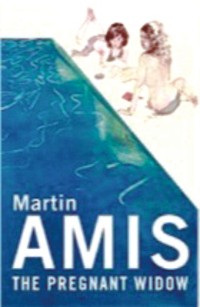Book Review
First Principles
Tim Adams
 |
The Pregnant Widow
by Martin Amis
480pp, Jonathan Cape, £18.99 |
For at least the past decade Martin Amis has seemed intent on making the most distinctive comic voice in contemporary British fiction his own do the most unlikely things. He's put it in the mouths of historical tyrants and 9/11 plotters, he tried it out for size for laughs as an impotent monarch and in earnest as a survivor of Soviet purges. He's had a go at Americans called Russia and women called He and one of the problems with all these characters is that they have sounded too smart, too Mart. The first thing to say about Amis's 12th novel, The Pregnant Widow, then, is that it is a great relief to find him back as a Keith.
The moniker might be a nod to Keith Talent, the antihero of Amis's last wholly successful novel, London Fields, but Keith is a homecoming for Amis in more than this sense. Keith Nearing is the most proximate a fictional alter ego he's written since Charles Highway in The Rachel Papers. This Keith is nearing 21 (his birthday, when our tale begins, is days away), he's nearing normal male height, like the author, "in that much disputed territory between five foot six and five foot seven", and he's inching toward a statuesque 20-year-old blonde named Sheherazade, with whom he is sharing a fabled summer in an Italian castle, along with several friends (including his semi-platonic and semi-liberated girlfriend, Lily).
Amis starts with a typically arch disclaimer, the suggestion that his tale like the murder story in London Fields is another "gift from real life". "Everything that follows is true," he drawls, blowing smoke at the reader. "The castle is true. The girls are all true, and the boys are all true. Not even the names have been changed. Why bother? To protect the innocent? There were no innocent…" He has said elsewhere that the novel is "blindingly autobiographical" and, though names obviously have been changed, you half believe him.
The version of his youth that Amis gives us here is a fleshed-out reincarnation of the narcissist he described briefly in Experience, "short-arseing along the King's Road" in green velvet flares, sending letters to Kingsley that concluded "Kafka is a fucking fool" or "Middlemarch is fucking good". "Aren't they nice, the young?" Keith's older self observes, here: "They have stayed up for two years drinking instant coffee together, and now they are opinionated they have opinions…."
Consciously inhabiting the past, particularly this skewed slice of his own past, seems to liberate his writing from unwitting self-parody. He (and the reader) are spared the awkwardness of the last "big" novel, Yellow Dog, which seemed to be formed of a desperation to continue to accommodate what John Self once called (when Amis was really on the money) "the real stuff, the only stuff… the present, the panting present". Looking back he knows every contour of the territory, the sex, the politics, the pretensions, and most of all the language. By framing his recollections in the present it's not Keith that is speaking, we eventually learn, it's his grown-up conscience, the Jiminy Cricket of 2009 looking back on the Pinocchio of 1970 he finds he can have it all ways.
For the most part Amis stays within the limits of this comedy of manners; when he is finally tempted to stray beyond it in the latter third of the book, with the introduction of the girl Keith eventually does get, and regret, his substitute Sheherazade, Gloria Beautyman, the plotting creaks just slightly. Beautyman spins Keith seductive yarns about her age, and her religion, truths that are unveiled in an ending that strains for universal significance. This intervention can be forgiven, though, in some vintage Amis peacockery: riffs on the earthiness of Italian plumbing and the obviousness of Italian men, on Montaigne and Northanger Abbey, and fresh updates on such familiar refrains as hangovers ("The air itself was about to throw up. And he could hear the yellow birds in their tree pissing themselves laughing…") or the evolutionary insistence of winged insects, those "armoured survivalists with gas-mask faces".
For a long while, it has been hard to imagine how a writer much concerned with reputation would begin to fashion for himself a convincing late period to match his stellar youth. This novel looks a lot like one answer to that. Amis has, of late, become a professor of creative writing at Manchester University and you could even begin to imagine that his position has prompted a satisfying return to first principles. Lesson number one: always write what you know.
opyright
(R) thedailystar.net 2010 |
